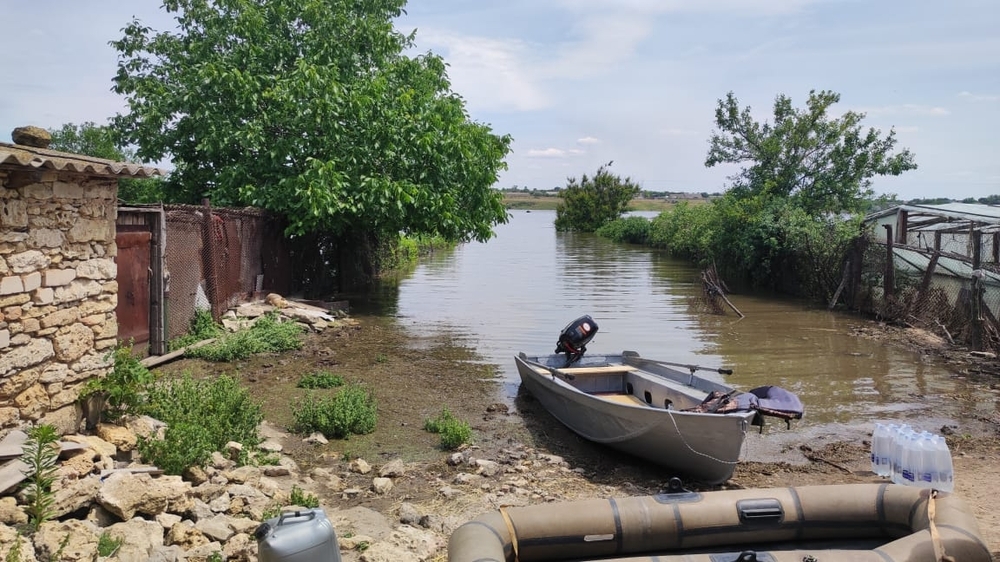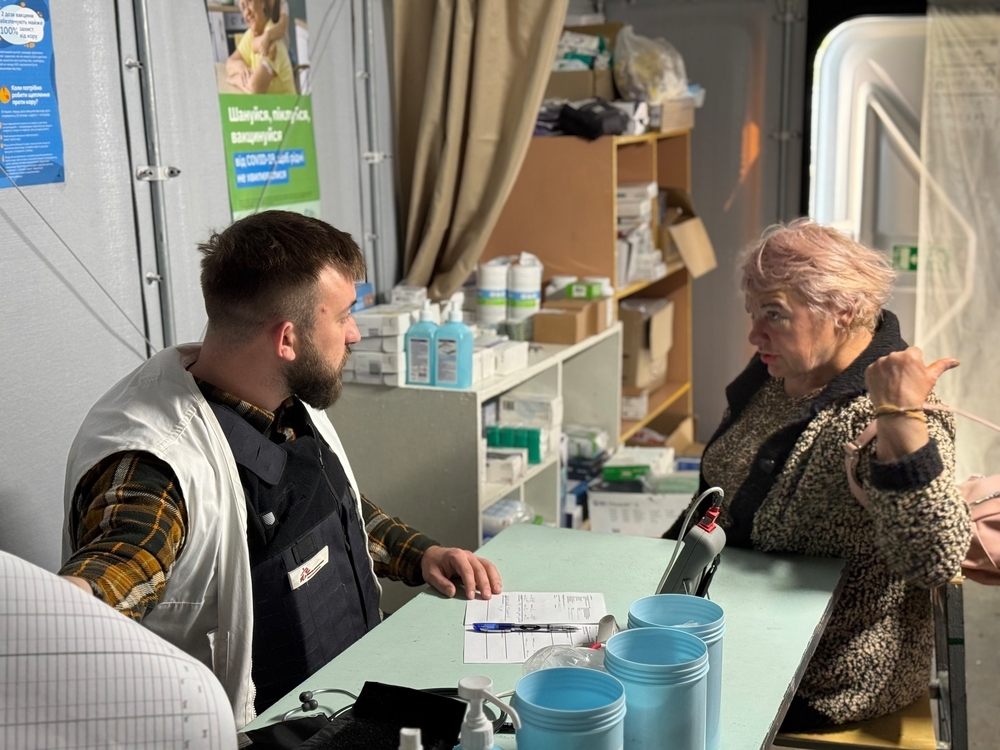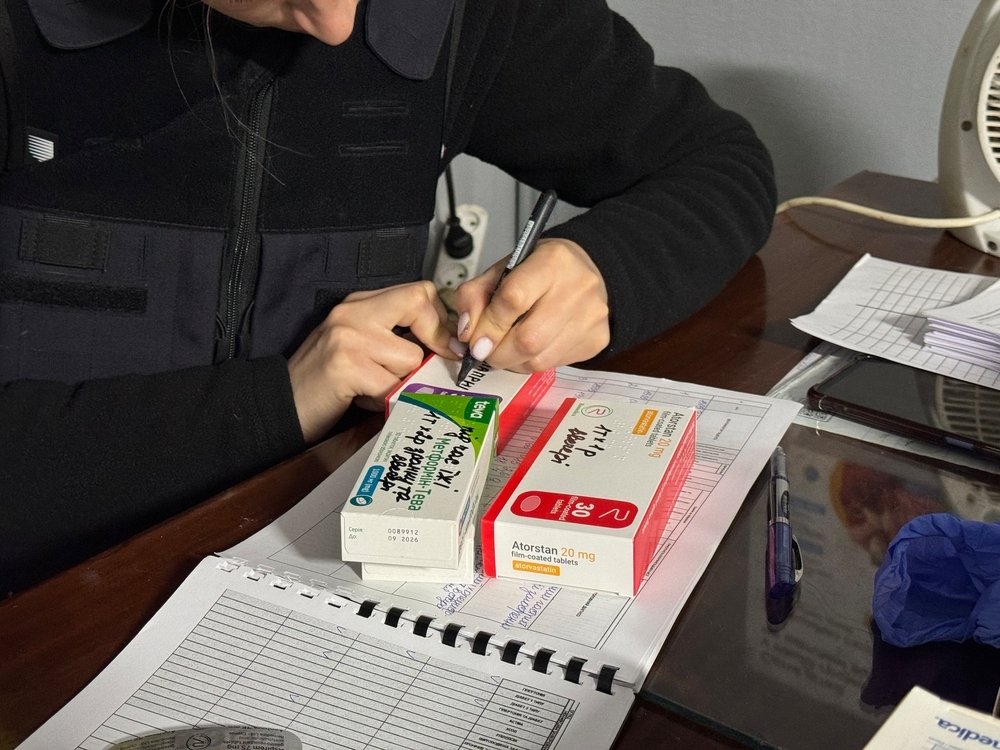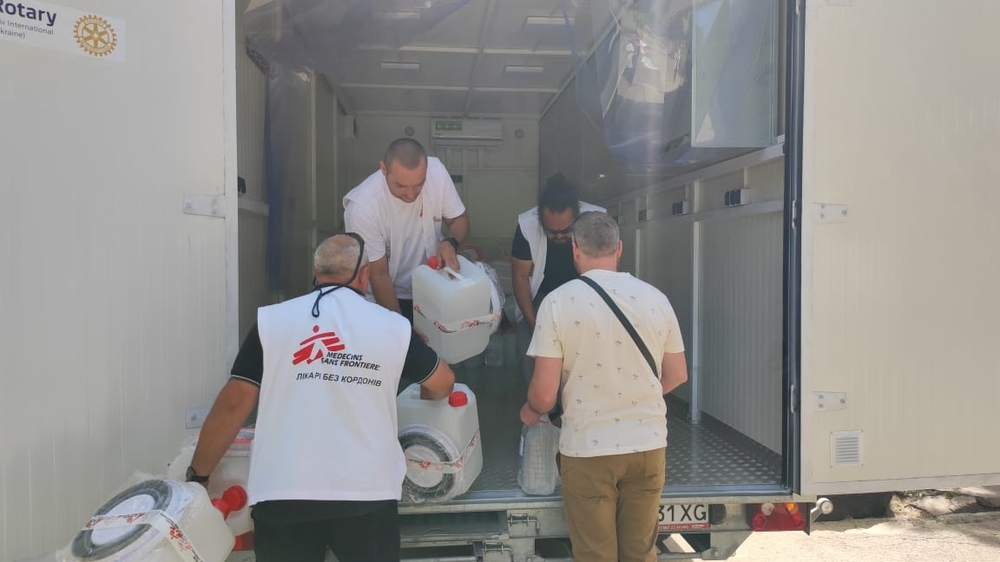The Médecins Sans Frontières (MSF) mobile clinic team is returning from the Kherson region after an intense day of seeing patients. The road goes along the river Inhulets. Cows are grazing on the green slopes along the bank, and the fields are ripening, but the destroyed buildings in every village we pass and the “Beware of Mines” signs constantly remind us of the war.
A year ago, one of the biggest disasters since the start of the full-scale war took place here in the southern part of Ukraine. At least 15 died, 80 flooded settlements, more than 37,000 damaged houses, and the destruction of the water supply system for a million people were the consequences when the Kakhovka hydroelectric power station dam was destroyed, according to the UN.
Some of the territories flooded then are under Russian military occupation and the international community has been denied humanitarian access to them.
“We were delivering medicines by boat”

The Inhulets is a tributary of the Dnipro River that flows through three regions: Dnipro, Mykolaiv, and Kherson. After the destruction of the Kakhovka hydroelectric power station on the night of 6 June 2023, 18 cubic kilometers of water poured into the Dnipro within three to four days, leading to a significant rise in the water level in the river and its tributaries, including the Inhulets.
MSF medical activity manager Vladyslav Butskyi remembers that day well. Then, he worked as a doctor in one of our mobile clinics. “In the morning, as usual, we went to Snihurivka in the Mykolaiv region. But the water was rising, and by the end of the day, it was impossible to cross the Inhulets River on the bridges.”
The following day, Médecins Sans Frontières purchased large quantities of water and containers for storage and began distributing them to residents. However, reaching the opposite bank of the Inhulets proved to be a much more challenging task.
For this, MSF sought the support of volunteers. We brought packs with water, water disinfectants, and medicine kits, and residents took all this to the other side by boat.
Vladyslav particularly remembers the story of a patient from a village with the same name as the river Inhulets. “I got a call from a doctor from there and she said that this woman’s [blood]sugar was extremely high and rapidly increasing. Neither the paramedic nor any of the neighbours had any medicines that could help. So, we sent everything we needed by boat from the village of Fedorivka, located across the river,” Vladyslav recalls.
After a while, thanks to residents, the Médecins Sans Frontières team found a single bridge that had not been flooded, which allowed them to continue to see patients on the other side of the river.
One Year After
In Novosofiyivka, Mykolaiv region, MSF mobile clinic is conducting consultations at the local medical unit. There is a queue of residents in the corridor, mostly elderly women. While they are waiting, MSF health promoter, Olena Lyubarska, tells them how to avoid cardiovascular diseases and offers them some tea.


Olha Panich is talking and laughing with her friends. Finally, it is her turn to see a doctor. MSF doctor Ruslan Shpara checks her blood pressure and blood sugar levels and prescribes the necessary medicines. Remembering the destruction of the Kakhovka hydroelectric power station, she starts to cry. “The lower street there, the river bank, the lower houses, and gardens were all flooded. People left that area and moved to higher ground.”
One Nurse Per Village

The destruction of the Kakhovka hydroelectric power plant dam has had a significant impact on the healthcare system in southern Ukraine, which is also affected by the fighting. Destroyed hospitals, a lack of medical staff, and daily shelling are the conditions under which healthcare workers in the Kherson and Mykolaiv regions work.
Ministry of Health nurse Olha Varenyk shows a medical facility in the village of Virivka in the Kherson region. Now just over two hundred people are left here. During the Russian military occupation of the village, the facility was destroyed and looted. Initially, the woman was conducting medical check-ups in her home, but recently a modular structure was installed in her yard, allowing her to see patients there. In addition, the MSF mobile clinic regularly visits the village and works with Olha in this structure.
Olha Varenyk admits that working alone is not easy, but she does not want to leave: “This is my home. I grew up here. I help people in their time of need. These are my people. I love them.”
Médecins Sans Frontières continues to work near the frontline. Our mobile clinics are staffed by doctors, paramedics, nurses, social workers, and psychologists who provide medical services and medicines to residents of towns and villages in Kherson, Mykolaiv, Kharkiv, and Donetsk regions of Ukraine. MSF ambulances also operate here, transporting patients to hospitals. In addition, our teams support frontline hospitals with medical donations.
-
Related:
- disasters
- khakhova
- MSF
- MSF in Ukraine
- MSF Ukraine
- Ukraine












